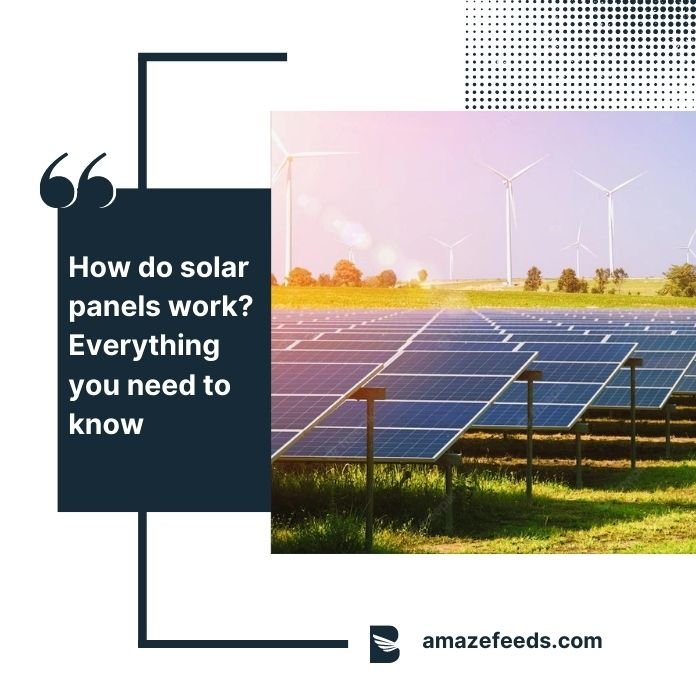This blog post will estimate everything you need to know about solar panels. We will discuss the different types of solar panels, their benefits and drawbacks, and how they can be a source to save money on your energy bill.
Have you ever wondered how solar panels work? Are you curious about the science behind them? If so, you’re in luck! This blog post will explain everything you need to know about solar panels. We’ll cover the basics of photovoltaics, including what makes them work and the materials used in their construction. We’ll also debate about different types of solar panels and their various benefits.
Here’s the thing about solar panels: they’re not as complicated as you think. Sure, the technology behind them is pretty intricate, but when it comes down to it, all that matters is their work.
In this guide, we’ll break down everything you need to know about solar panels. We’ll start with the basic to more complex topics by the end of this post, and you’ll be an expert on solar power. Read on;
How Do Solar Panels Work?
You’ve probably visualized solar panels on roofs and wondered how they work. How do those little panels turn the sun’s energy into electricity?
We’ll explore how they convert sunlight into energy and discuss some benefits of using solar panel and how to find best solar system companies in Pakistan.
So let’s get started!
What Are Solar Panels Made Of?
Solar panels are semiconductors that capture the sun’s energy and convert it into electricity.
The most basic type of semiconductor material is silicon, which is why most solar panels are made of silicon. However, solar panels can also be made from other materials, like cadmium telluride or copper indium gallium selenide (CIGS).
When the sun’s energy hits the semiconductor material, it creates an electric field and starts generating electricity. This electricity is then accumulated by the solar panel and sent to your home or business. Pretty cool, right?
How do Solar Panels Produce Electricity?
You’ve probably visualized solar panels on roofs and wondered how they work. Solar panels convert sunlight into electricity, and the process is a lot more straightforward than you might think.
Here’s a simplified overview: solar panels have tiny semiconductors that convert sunlight into energy. This energy is then converted into an electrical current, which flows through the wires in the solar panel and then iinside your home.
Few things to be in mind when it comes to solar panels—like they need direct sunlight to work their best—but that’s the basics.
What Are the Benefits of Solar Panels?
Here are four significant benefits of solar panels:
- You’ll do your part to help the environment by using renewable energy.
- Solar panels will reduce your electricity bill and save you money in the long run.
- You’ll be making a sound investment, as the cost of solar panels has been dropping in recent years.
- You’ll be helping to create a more sustainable future for our planet.
Are There Any Drawbacks to Solar Panels?
So are there any drawbacks to solar panels?
There are a few. The first is that panels can be expensive to install, and the second can only be used in certain climates.
But despite these drawbacks, solar panels are still a significant investment. They can help you save money on your energy bills, and they’re a great way to do your social responsibility in reducing your carbon footprint.
Before You Install One on Your Home, What You Need To Know About Solar Panels
So, you’re interested in getting solar panels for your home? That’s great! Here’s a little guide on how they work and how you can get them installed.
Solar panels work by converting the sun’s energy into electric energy. It can be done by using photovoltaic cells, which are made of semiconductor materials. When the sun shines on the cells, the energy from the sun is converted into electrical energy.
The electricity produced by the solar panels can be used to power your home, or you can sell it back to the grid. You can get a credit from your utility company for the surplus energy if you generate more energy than you use,
You’ll need a reliable and professional solar installer to get solar panels for your home. Many are out there, so do your research and ask for recommendations. Once you’ve found a good installer, they’ll help you determine if your home is suitable for solar panels and handle everything from installation to maintenance.
Conclusion
Now that you know how solar panels work, it’s time to start your installation. Remember, the most crucial part of the process is finding a qualified and experienced solar installer. Once you have your solar panels fixed, you can enjoy years of free energy from the sun!
